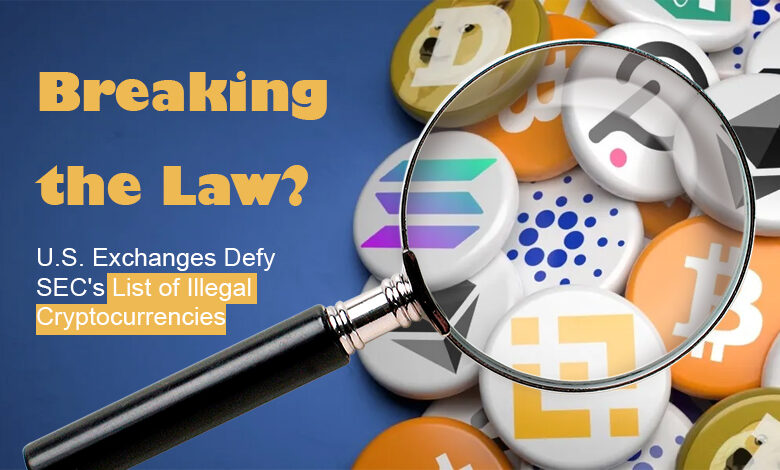Breaking the Law? U.S. Exchanges Defy SEC List of Illegal Cryptocurrencies

For the past few years, the Securities and Exchange Commission (SEC) has been actively trying to oversee and control the use of cryptocurrencies.
The SEC believes that it has the power to regulate various digital coins and their trading platforms. However, the SEC’s jurisdiction is limited to only those cryptocurrencies that are classified as securities, such as stocks and bonds.
SEC’s Chairman, Gary Gensler, has stated that the majority of crypto tokens fall under this category, which implies that many of them were sold unlawfully. This is because securities can only be offered to the public if they are registered with the SEC, and the issuers must provide financial and risk disclosures. Consequently, any issuer who sells securities, including crypto tokens, to the public without registration, may face legal action for breaching investor-protection laws.
Since the end of 2017, 76 cryptocurrencies have been identified by the SEC and U.S. courts as securities. Nevertheless, there are over 23,000 available worldwide, and not all of them are being traded in the U.S.
Out of the 76 coins classified as securities by the SEC, 16 were still being traded on one or more major U.S. crypto exchanges, as of early May, and some tokens were removed from the exchanges following SEC enforcement actions.
Approximately 37 of these coins were accused of fraudulent behavior by the U.S. regulator body, which is almost half of the identified securities. As of May 5, 2023, there were 4 tokens that were still available for trading on U.S. exchanges, and litigation was pending for those claims.
The digital coin XRP, issued by Ripple Labs, is the largest by total value in circulation among those classified as securities by the SEC. In 2022, the number of tokens identified as securities nearly tripled from the previous year as the SEC began targeting other illegal activities within lawsuits that did not necessarily focus on the issuers themselves. Currently, litigation is ongoing for 32 of the coins, while there have been judgments and settlements for 14 and 26 tokens, respectively.
In 2017, regulators cautioned crypto companies that a significant number of cryptocurrencies may be classified as securities, utilizing a test from the Supreme Court to define them.
Over the years, the SEC has recognized almost 80 crypto tokens as securities, many of which were linked to fraudulent activities, according to WSJ’s analysis.
Nonetheless, this figure represents only a small percentage of the total number of cryptocurrencies traded in the U.S. since each token necessitates a thorough legal analysis.
It is worth noting that the SEC’s enforcement actions mostly targeted digital coins that were not traded on major crypto exchanges. As a matter of fact, XRP, one of the top-10 cryptocurrencies, was the only digital coin the SEC labeled as an unregistered security.
As a result, major American exchanges like Kraken and Coinbase delisted XRP, making it inaccessible to users.
There is no doubt that the industry’s criticism of the SEC’s use of enforcement to designate specific cryptocurrencies as securities has risen, claiming that regulators are extending their jurisdiction through forceful tactics. However, according to Gensler, developers have been aware of the SEC’s stance for years and are responsible for determining when securities laws are applicable.
This has led to some crypto exchanges, including major players like Binance, closing down or moving operations outside of the US. In contrast, the United Arab Emirates has been praised for its proactive approach to regulating crypto, with clear and transparent guidelines that have encouraged innovation and investment in the industry.
As a result, the UAE has become a hub for digital transformation and a destination for businesses looking for a more favorable regulatory environment.




